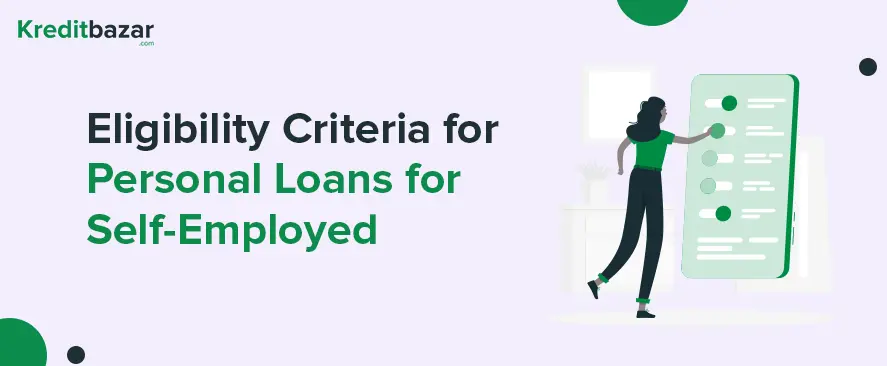![]()
In today’s fast-paced world, personal loans have become a convenient way for individuals to meet their financial needs, whether it’s for personal or business purposes. However, when it comes to self-employed individuals in India, getting a personal loan is a bit more challenging than for their salaried counterparts. This is largely due to the fluctuating nature of their income, lack of a fixed salary, and the overall perception of risk associated with self-employment.
Understanding the eligibility criteria for personal loans for self-employed individuals is crucial because it plays a significant role in determining the success of your loan application. With a clear grasp of the requirements, self-employed individuals can improve their chances of getting a loan that caters to both personal and professional needs.
The purpose of this blog is to provide you with detailed insights into the eligibility criteria for self-employed personal loans, helping you understand the specific requirements set by banks and non-banking financial companies (NBFCs) in India. Whether you’re a small business owner, a freelancer, or a professional working for yourself, knowing what is required can simplify the process and enhance your financial planning.
Table of Contents
Overview of Personal Loans for Self-Employed
A personal loan for self-employed individuals is a type of unsecured loan that can be used for both personal and business-related expenses. Unlike business loans, which are specifically for business expansion or operations, personal loans can be used to meet any financial requirement—whether it’s to manage cash flow, consolidate debt, or finance personal commitments like weddings, medical emergencies, or vacations.
For self-employed individuals, these loans provide flexibility in usage. Since many self-employed people experience fluctuating income, having access to a personal loan can be a financial cushion during periods of low revenue or unexpected expenses. This is why personal loans are particularly important for self-employed individuals—they offer much-needed liquidity without the need to dip into business funds or personal savings.
Unlike salaried employees, who can show a regular monthly income, self-employed individuals have to prove their financial stability through income tax returns, profit & loss statements, and bank account details. This makes the process slightly more rigorous for them, but it also provides the opportunity to avail loans at competitive rates if the eligibility requirements are met.
Why are Eligibility Criteria Different for Self-Employed Individuals?
The eligibility criteria for self-employed individuals are inherently different from those applied to salaried employees due to the nature of their income and work profile. Salaried individuals generally have a steady income, supported by salary slips and Form 16. However, self-employed individuals may not have this kind of consistent income stream, which increases the perceived risk for lenders.
Key Differences in Eligibility for Self-Employed Applicants:
- Income Stability: One of the primary concerns for lenders is the stability of income. Since self-employed individuals may not earn a fixed monthly salary, lenders assess their overall financial health by reviewing their income over some time—typically 2 to 3 years. Tax returns and bank statements are key documents that reflect an applicant’s earning capacity.
- Business Vintage: Unlike salaried individuals, who only need to meet a certain employment tenure, self-employed individuals often need to show that their business has been operational for a specific number of years, usually at least 3 to 5 years, depending on the lender. This ensures that the business is established and generates consistent revenue.
- Credit Score: While credit scores are important for both salaried and self-employed individuals, they hold even more weight for the latter. A good credit score (typically 700 and above) is essential in proving the borrower’s reliability, especially when there’s no fixed monthly income.
- Turnover and Profitability: In addition to income, lenders assess the turnover and profitability of the business. For self-employed professionals (like doctors, architects, etc.), the minimum turnover requirement is generally lower compared to self-employed non-professionals (like shop owners or traders). Banks may also require that the business shows consistent profits for a couple of years.
Challenges Faced by Self-Employed Individuals:
- Fluctuating Income: Since the income of self-employed individuals is often inconsistent, this makes it harder for them to meet the criteria set by lenders. During lean periods, their income might fall short, making it difficult to qualify for a loan.
- Lack of Regular Income Proof: Unlike salaried employees who can easily present salary slips, self-employed individuals need to rely on documents like income tax returns and audited financials to prove their earnings, which can be a tedious process.
Risk Perception by Lenders:
Banks and NBFCs generally consider self-employed individuals as higher-risk borrowers compared to salaried applicants. This is due to the unpredictability of their income and market factors that may affect their business. As a result, self-employed borrowers might face stricter eligibility criteria or higher interest rates. However, a solid financial history, strong credit score, and stable business can mitigate these risks.
Key Eligibility Criteria for Self-Employed Personal Loans
When it comes to securing a personal loan for self-employed individuals, lenders have specific eligibility criteria that applicants must meet. Understanding these factors is crucial for increasing your chances of loan approval.
1. Age Criteria
One of the fundamental eligibility criteria is age. Lenders typically set both minimum and maximum age limits for self-employed applicants. Most banks and NBFCs in India require borrowers to be between the ages of 22 to 65 years.
- Why Age Matters: Younger applicants may not have the required work experience or financial stability, while older individuals
- near retirement may be considered high risk due to reduced future earning potential.
- How Age Affects Loan Approval: Being within the specified age range ensures that the lender feels confident about your ability to repay the loan during your active earning years.
2. Income Criteria
Income is a key parameter for loan approval. For self-employed individuals, lenders usually require a minimum annual income threshold to be met. This is to ensure that the borrower has the financial capacity to repay the loan.
- How Lenders Assess Income: Unlike salaried employees, who provide salary slips, self-employed individuals must rely on documents such as income tax returns (ITR), profit and loss statements, and bank statements to prove their income. Lenders also look for income stability over the last 2-3 years, ensuring that the applicant can manage the loan repayments.
3. Work Experience and Business Vintage
Lenders assess not only the income but also the professional standing and experience of the borrower. A self-employed individual must have:
- Minimum Work Experience: Most lenders require at least 4 years of work experience after qualification. This helps demonstrate the borrower’s professional stability and reliability.
- Business Vintage: For self-employed applicants, lenders prefer businesses that have been in operation for a minimum of 3 to 5 years. This proves the longevity and consistency of the business, which lowers the risk for lenders.
- Why Business Vintage Matters: The longer the business has been operational, the more reliable it is considered. A newer business may pose higher risks for lenders due to the lack of a proven track record.
4. Minimum Turnover Requirements
Lenders set minimum turnover requirements based on the type of business operated by self-employed individuals. These requirements differ for professionals (doctors, lawyers, etc.) and non-professionals (shop owners, traders).
- Common Turnover Requirements:
- For professionals: The minimum turnover requirement is usually lower, around ₹15 lakhs annually.
- For non-professionals: The minimum turnover requirement is generally higher, at least ₹40 lakhs annually.
This ensures that the borrower is generating enough revenue to cover the loan repayments.
5. Credit Score Criteria
Your credit score is one of the most important factors determining loan approval. Most lenders expect a minimum credit score of 700-750 for self-employed individuals.
- Why Credit Score is Crucial: A good credit score reflects your ability to manage credit responsibly. For self-employed individuals, maintaining a high credit score is essential because it can offset the perceived risk of fluctuating income.
- Credit Score Requirements: If your credit score is below the required threshold, you may face higher interest rates or even loan rejection.
6. Business Type and Industry
The type of business or industry you are involved in can also impact loan approval. Certain industries are considered higher risk than others, and this may affect your chances of getting a loan.
- Lender Preferences: Some lenders may prefer to work with self-employed professionals in industries like healthcare, law, or IT due to the more stable and predictable income. High-risk industries such as trading or small retail may be viewed with caution.
- How Business Type Affects Approval: The nature of your business can determine not only whether your loan is approved but also the interest rates and terms offered.
7. Relationship with Lender
Having an existing relationship with the lender can sometimes increase your chances of loan approval. Lenders may prefer applicants who already have accounts or prior loans with them.
- Why Relationships Matter: Long-term relationships with banks or NBFCs build trust. If you have a good track record with your bank, they may be more willing to offer you a loan with favourable terms.
- Easier Loan Processing: Existing customers often experience a smoother and quicker loan approval process, as the lender already has access to your financial history.
Other Factors Impacting Loan Approval
1. Income Stability and Documentation
One of the major concerns for lenders when approving loans for self-employed individuals is income stability.
- Demonstrating Income Stability: To improve your chances of loan approval, ensure that you maintain accurate records of your earnings, file timely tax returns, and keep your profit and loss statements up to date. Consistent income, as demonstrated through proper documentation, will reduce the perceived risk for the lender.
2. Existing Liabilities
Lenders will also look at your existing liabilities when determining your loan eligibility.
- How Liabilities Affect Approval: If you already have multiple loans or debts, it may reduce your chances of getting another loan. Lenders assess your debt-to-income ratio, which measures how much of your income is already committed to other obligations.
- Disclosure of Financial Obligations: Be transparent about your existing liabilities. Hiding loans or debts can lead to disqualification and reduce your chances of future loan approvals.
3. Financial History and Tax Compliance
Maintaining a clean financial history is essential for self-employed individuals seeking a personal loan.
- Importance of Tax Compliance: Filing your income tax returns on time and avoiding any defaults or late payments can greatly improve your chances of loan approval. Lenders scrutinize your tax records to ensure you are financially responsible.
- Impact of Past Defaults: If you have any prior defaults or missed loan repayments, this can significantly reduce your chances of getting approved for a new loan.
Documents Required for Self-Employed Personal Loan Eligibility
When applying for a personal loan as a self-employed individual, providing the correct documents is essential for ensuring a smooth approval process. Lenders typically require a variety of documents to verify your identity, address, income, and business operations.
1. Identity Proof
Lenders require applicants to submit valid identity proof. Common documents accepted for identity verification include:
- Aadhaar Card
- PAN Card
- Passport
- Voter ID
These documents confirm the applicant’s identity and help lenders process the loan more securely.
2. Address Proof
Lenders also require address proof to validate your current residence. Common documents accepted as address proof include:
- Utility Bills (electricity, water, or gas bill)
- Rent Agreement
- Passport
- Property Tax Receipts
Providing accurate and up-to-date address proof ensures that lenders can track applicants if necessary.
3. Income Proof
One of the most crucial documents for self-employed individuals is income proof. Since there are no salary slips, self-employed individuals must rely on Income Tax Returns (ITR).
- Income Tax Returns (ITR): Typically, lenders ask for ITR of the past 2-3 years to assess income stability and the applicant’s ability to repay the loan. The higher and more consistent the income, the better the chances of approval.
4. Bank Statements
To verify cash flow and financial health, lenders require bank statements from the last 6 months.
- Bank Statements: These statements provide a clear picture of your monthly earnings, expenses, and existing liabilities, helping lenders assess your financial stability.
5. Business Proof
Self-employed applicants often need to provide business proof, especially if they are running a registered business.
- GST Registration
- Business Registration Documents
These documents demonstrate that your business is legitimate and generates revenue, which helps improve your loan eligibility.
6. Other Supporting Documents
Additional supporting documents may also be required depending on the type of business you run:
- Partnership Deeds (if applicable)
- Financial Statements: Lenders may also ask for profit and loss statements, balance sheets, and other financial documents, particularly for larger loan amounts.
Providing comprehensive supporting documents enhances your credibility and strengthens your application.
Tips to Improve Your Eligibility for a Self-Employed Personal Loan
Securing a personal loan as a self-employed individual can be challenging. However, there are several strategies you can use to improve your loan eligibility and boost your chances of approval.
1. Maintain a Good Credit Score
Your credit score is one of the most important factors lenders consider. To improve your chances of getting approved, focus on maintaining a credit score of 700 or higher.
- How to Maintain a Good Credit Score: Pay your bills and existing loans on time, avoid maxing out credit cards, and regularly monitor your credit report for errors.
- Why it Matters: A good credit score reduces the perceived risk for lenders, especially for self-employed individuals with fluctuating incomes.
2. Improve Financial Documentation
Lenders rely heavily on financial documentation to assess loan eligibility. To strengthen your loan application:
- Organize Your Documents: Ensure that your ITR, bank statements, and profit & loss statements are clear and well-organized.
- Keep Tax Returns Up-to-Date: Consistently filing ITR for at least the last 2-3 years shows a stable income, improving your credibility with lenders.
3. Build a Relationship with Lenders
Establishing a long-term relationship with a bank or NBFC can significantly increase your loan approval chances.
- Why Relationships Matter: Lenders prefer working with applicants they are familiar with. Having a savings or business account with a lender can help you secure loans more easily.
- Regular Engagement: Consider engaging regularly with your bank through small loans or other financial products to build a trustworthy relationship.
Common Challenges Faced by Self-Employed in Meeting Eligibility Criteria
Self-employed individuals often face unique challenges when applying for personal loans, primarily due to fluctuating income and stricter documentation requirements.
1. Fluctuating Income
Self-employed individuals generally do not have a fixed monthly income, which can pose a challenge during loan application processes.
- How it Affects Loan Approval: Lenders prefer applicants with stable, predictable income. Irregular earnings can make it difficult to meet minimum income thresholds or provide consistent financial documentation.
- Overcoming This Challenge: Regularly file your income tax returns and maintain detailed financial records to demonstrate income consistency.
2. Difficulty in Providing Income Proof
Unlike salaried employees who can present salary slips, self-employed individuals often face challenges in proving their income through proper documentation.
- Income Proof Challenges: Lenders require ITR, bank statements, and business proof, which may not always reflect the true earnings of a self-employed applicant, especially if business revenue fluctuates seasonally.
- How to Handle This: Maintaining organized and transparent financial records will help reduce rejection rates due to insufficient income proof.
3. Higher Rejection Rates Due to Perceived Risk
Lenders perceive self-employed individuals as riskier applicants due to uncertain cash flows and irregular income.
- Why Rejections are Higher: Self-employed applicants are more likely to face loan rejections compared to salaried individuals because of their perceived financial instability. Lenders often require more stringent documentation or offer higher interest rates to offset the risk.
- Addressing the Risk: Having a good credit score, stable financial documents, and maintaining a relationship with your lender can mitigate this risk.
How to Choose the Right Lender for Self-Employed Personal Loans
Choosing the right lender for a self-employed personal loan is crucial for getting the best terms and ensuring a smooth approval process. Here are the key factors to consider when selecting a lender:
1. Interest Rates
One of the most important factors to consider is the interest rate offered by the lender. Even a small difference in interest rates can significantly impact the total repayment amount. Here’s what to keep in mind:
- Compare Rates: Different lenders, including banks and NBFCs, offer varied interest rates based on your credit score, income stability, and loan amount.
- Fixed vs. Floating Rates: Understand whether the interest rate is fixed or floating, as this can affect your monthly EMI.
2. Eligibility Criteria
Each lender has different eligibility criteria based on factors like credit score, income level, business vintage, and turnover requirements.
- Check Requirements: Review the eligibility criteria for self-employed individuals before applying to avoid rejection.
- Consider Flexibility: Some lenders offer more flexibility in their criteria, particularly if you have an existing relationship with them.
3. Reputation and Customer Service
The lender’s reputation is crucial, especially for self-employed individuals who may need personalized assistance during the loan process.
- Research Reviews: Look for customer reviews and ratings on various financial platforms to gauge the lender’s reputation.
- Customer Support: Good customer service ensures a smoother loan process, especially if you need assistance with document submission or post-loan services.
4. Loan Processing Time
For self-employed individuals, quick access to funds can be vital, especially for business purposes.
- Check Processing Time: Some lenders offer faster loan disbursement times than others, which can be important if you need urgent funding.
- Pre-Approved Loans: If you have an existing relationship with a lender, you might qualify for a pre-approved loan, which speeds up the process.
5. Additional fees
Apart from the interest rates, it is essential to consider the fees and hidden charges associated with the loan, such as:
- Processing Fees
- Prepayment Penalties
- Late Payment Charges
These can add to the overall cost of the loan, so comparing different lenders’ fee structures is important.
6. Comparing Offers from Multiple Lenders
To get the best deal, it is essential to compare offers from multiple lenders. Banks and NBFCs often offer different interest rates, terms, and benefits. Here’s how to compare:
- Use Online Comparison Tools: Many financial platforms provide tools that allow you to compare interest rates, fees, and eligibility criteria from multiple lenders.
- Consider Personalized Offers: Some lenders may offer personalized loan terms based on your credit history or existing relationship with the bank.
Conclusion
In conclusion, securing a personal loan as a self-employed individual requires careful planning and consideration of various factors. By understanding the key eligibility criteria and preparing the necessary documentation, you can significantly improve your chances of loan approval.
To recap, the main factors that determine your eligibility for a personal loan include:
- Credit Score: Aim for a score of 700 or above.
- Income Stability: Provide consistent income proof through ITR and bank statements.
- Business Vintage: Lenders often require a minimum number of years in business.
- Turnover and Documentation: Meeting turnover requirements and organizing your financial documents can increase your approval chances.
To improve your chances of approval:
- Maintain a High Credit Score: Regularly monitor your credit score and take steps to improve it.
- Improve Financial Documentation: Keep your ITR, bank statements, and business proof up-to-date and well-organized.
- Compare Lenders: Choose the right lender by comparing interest rates, fees, and eligibility criteria from multiple banks and NBFCs.
By being proactive and carefully selecting the right lender, you can ensure that you get the best possible deal for your financial needs.
At Kreditbazar, we offer tailored personal loan solutions for self-employed individuals. Explore our personal loan options today and find the perfect loan that suits your financial needs.
Frequently Asked Questions on Eligibility Criteria for Personal Loans for Self-Employed
Q1. What is the minimum age to apply for a personal loan as a self-employed individual?
Ans1. The minimum age to apply for a personal loan as a self-employed individual is typically 22 years. However, this may vary by lender.
Q2. What is the maximum age limit for self-employed individuals to apply for a personal loan?
Ans2. The maximum age limit for self-employed individuals to apply for a personal loan is generally 65 years, but this may vary depending on the lender’s policy.
Q3. How much income is required for a self-employed person to qualify for a personal loan?
Ans3. Most lenders require a minimum annual income of ₹2-3 lakhs for self-employed individuals, though the exact amount can vary depending on the lender.
Q4. Do self-employed individuals need to show tax returns to apply for a personal loan?
Ans4. Yes, most lenders require self-employed applicants to provide income tax returns (ITR) for the past 2-3 years as proof of stable income.
Q5. How does work experience affect personal loan eligibility for self-employed individuals?
Ans5. Lenders typically require self-employed applicants to have a minimum of 4 years of work experience, including business operations, to ensure financial stability.
Q6. What is the minimum credit score required for self-employed individuals to get a personal loan?
Ans6. Self-employed individuals usually need a credit score of 700-750 or higher to qualify for a personal loan, depending on the lender’s requirements.
Q7. What is business vintage, and why is it important for personal loan approval?
Ans7. Business vintage refers to the number of years your business has been operational. Most lenders require at least 3 years of business vintage to assess financial stability.
Q8. Do self-employed individuals need to provide business turnover proof for a personal loan?
Ans8. Yes, lenders typically require proof of business turnover through financial statements, especially for higher loan amounts, to ensure the applicant’s repayment capability.
Q9. Can a self-employed individual apply for a personal loan without collateral?
Ans9. Yes, most personal loans for self-employed individuals are unsecured, meaning no collateral is required, but the eligibility criteria may be stricter.
Q10. What types of businesses are preferred by lenders for personal loans?
Ans10. Lenders tend to favour stable and profitable businesses, with some industries being preferred over others due to perceived lower risk.
Q11. How do existing liabilities impact personal loan eligibility for self-employed individuals?
Ans11. Existing loans and debts can reduce your eligibility, as lenders consider your debt-to-income ratio when approving a personal loan.
Q12. Is it necessary to have a pre-existing relationship with the lender to apply for a personal loan?
Ans12. While not mandatory, having an existing relationship with the lender can improve your chances of approval and may even result in better loan terms.
Q13. What documents are required for a self-employed personal loan application?
Ans13. Key documents include identity proof (Aadhaar, PAN), address proof (utility bills), income proof (ITR), bank statements, and business registration documents.
Q14. How can self-employed individuals improve their chances of personal loan approval?
Ans14. Maintaining a good credit score, filing timely tax returns, showing stable income, and having proper financial documentation can improve loan approval chances.
Q15. What are the common reasons for the rejection of personal loan applications for self-employed individuals?
Ans15. Common reasons include low credit scores, inconsistent income, insufficient documentation, and high debt-to-income ratios.
Q16. How does fluctuating income affect personal loan approval for self-employed individuals?
Ans16. Lenders view fluctuating income as a higher risk, so showing consistent income through ITRs and bank statements is essential to improve approval chances.
Q17. Can self-employed individuals get a personal loan with poor credit history?
Ans17. It’s difficult but not impossible. A low credit score can result in higher interest rates or lower loan amounts, and some lenders may reject the application outright.
Q18. Are personal loans for self-employed individuals tax-deductible?
Ans18. No, personal loans are not tax-deductible unless used for specific purposes like business expenses, which may allow for certain deductions.
Q19. How long does it take to get a personal loan approved for self-employed individuals?
Ans19. Approval time can range from a few days to a couple of weeks, depending on the lender and the complexity of your financial situation and documentation.
Q20. How can self-employed individuals demonstrate income stability to lenders?
Ans20. Self-employed individuals can show income stability by submitting regular income tax returns, maintaining consistent bank account transactions, and providing financial statements.





